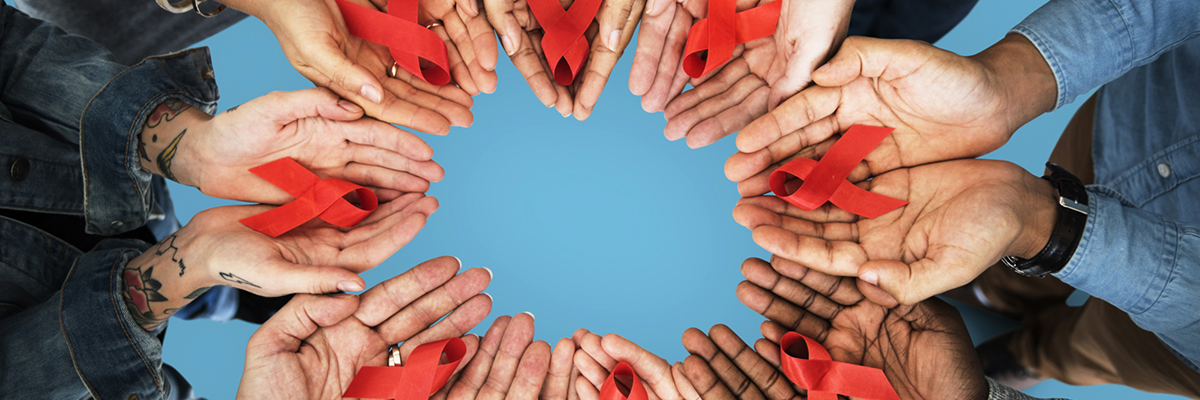
Approximately 1.2 million people in the United States are living with human immunodeficiency virus (HIV). Many people with HIV may not have any symptoms for years after becoming infected, and they might feel just fine. About 14 percent of these people (1 in 7) don’t know they have the virus and need testing. HIV is the cause of one of the world’s deadliest and most persistent pandemics; however, the disease is now manageable and a normal lifespan is possible through medication.
What is HIV?
HIV is a virus that attacks the immune system. Your body’s immune system fights infections. Having HIV makes it easier to get other infections and diseases.
Currently, there is no cure for HIV. However, there are HIV medicines (called antiretroviral therapy, or ART) that allow people infected with HIV to live long and healthy lives. They can also help prevent the spread of HIV to sexual partners.
If HIV is not treated with medicines, HIV leads to acquired immunodeficiency syndrome (AIDS).
What is AIDS?
AIDS is not a virus. AIDS is the set of symptoms and conditions that develop in the late stage of HIV infection. AIDS occurs when the immune system is badly damaged by HIV and can no longer fight other infections.
In the United States, most people with HIV do not develop AIDS because of the availability of HIV medicine. When correctly taken, HIV does not enter the AIDS stage. In the AIDS stage, the survival rate is one to three years.
HIV medicine can still provide help in controlling the AIDS stage. However, ART offers the most benefits when started as soon as possible after diagnosis.
Transmission and Risk Factors
In the United States, HIV is mainly spread by an infected person having sex or sharing needles and other injection equipment. Drug and alcohol use can contribute to these risks because they lower people’s normal ability to make safe decisions. For example, as not wearing a condom when the person normally would use a condom.
The HIV risk varies depending on how a person is exposed and their behavior. Risks also add up over time—the more risks are repeated, the higher the chance of eventually getting HIV. Some behaviors are riskier than others.
Risk factors for getting HIV include:
- Injection drug use
- Sharing needles
- Having an existing sexually transmitted infection (having other STIs compromises the immune system and makes it difficult to prevent another infection from entering the body)
- Unprotected anal sex (no condom)
- Unprotected vaginal sex (no condom)
- Unprotected oral sex (no condom)
- During pregnancy, delivery and/or breast feeding
This is not a complete list of risk factors. Information on other risk factors can be found on the Centers for Disease Control and Prevention’s website.
General human contact such as hugging, kissing, dancing or shaking hands with someone who has HIV or AIDS does not transmit the infection. HIV is also not spread through the air like a cold, water or insect bites.
Prevention and Getting Tested
Pre-exposure prophylaxis (PrEP) and post-exposure prophylaxis (PEP) are available. These medications should be taken by anyone at high risk of contracting HIV.
- PrEP prevents getting HIV through sex or drug use.
- PEP is taken to help prevent getting HIV after an exposure to the virus.
If you are sexually active or participate in injection drug use, getting tested on a regular basis (regular testing, depending on exposure, can be every three months to once per year) is important for your health and the health of your partner. All NJFPL-funded treatment centers offer HIV testing. Most primary care providers also offer HIV testing, as well as local health departments. There is even home testing available.
How Do HIV Tests Work?
Most HIV tests detect antibodies, which are proteins the body makes when exposed to an infection. Antibody tests do not test for the HIV virus. They only check for antibodies that are present if a person has HIV. These tests may not test positive until a few weeks after infection. This time is when the body starts producing the antibodies.
Other types of tests can detect HIV infection sooner. A more rapid test is used when a person has a recent exposure to HIV.
What If the Test is Positive?
If the test comes back positive for HIV, seeing a doctor immediately is very important in order to begin HIV medication. All sexual partners should be notified.
For HIV testing or to learn more about PrEP, contact an NJFPL-supported health center near you. Visit the Find A Health Center page and call to make your appointment today.
If you are experiencing any form of abuse and/or violence, please know that you are not alone. Help is available.
The New Jersey Coalition to End Domestic Violence offers lifesaving tools and immediate support 24/7 to empower victims and survivors of domestic violence to find safety and live free of abuse. Their toll-free 24/7 hotline is available at 1-800-572-SAFE (7233) or text LOVEIS to 22522.
The New Jersey Coalition Against Sexual Assault offers medical, legal and support services for survivors of sexual violence. Their toll-free 24/7 hotline is available at 1-800-601-7200.
Your safety comes first, all calls are confidential. If you or someone you know is in immediate danger, call 9-1-1.
